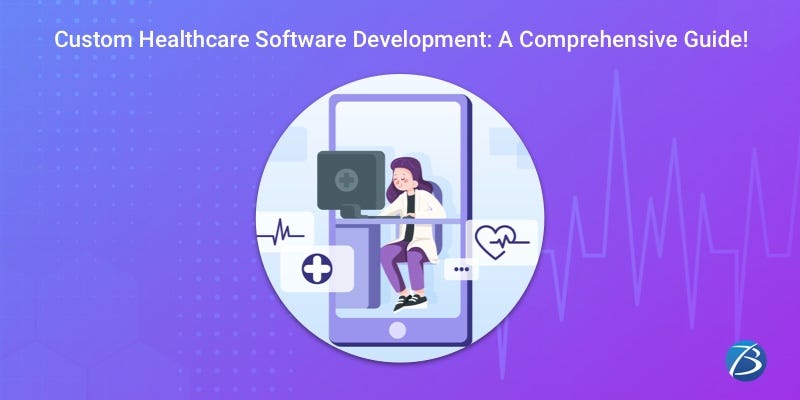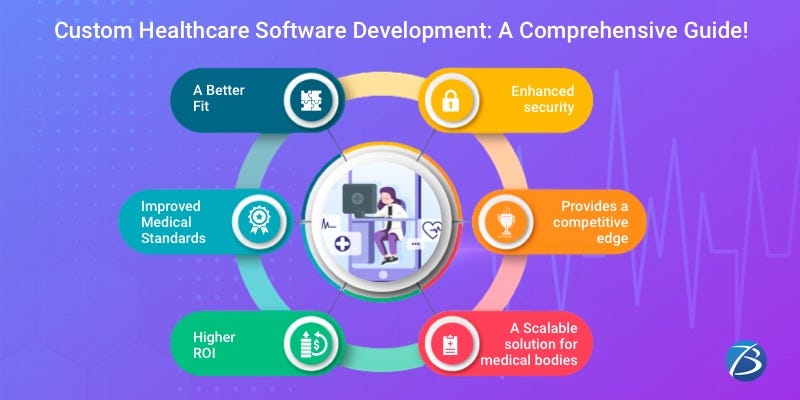
The advent of healthcare software solutions has been a boon to the healthcare sector! Such intelligent automated software has successfully addressed several operational lapses by medical bodies – erratic decision-making, mixing up of lab test results, medical equipment failures, inadequate employee training, miscommunication, non-adherence to standard safety practices, etc. And, needless to say, modern customers demand accuracy and competence from their healthcare service provider.
The Covid19 pandemic has accelerated the transition to digital technology; as patients, these days avoid visiting medical spaces unless it is absolutely necessary. Today, practices like online doctor consultation, sharing of digital patient records, etc. are becoming the new norm. As such, medical facilities, as well as clinicians, are under tremendous pressure to adopt healthcare IT solutions for digitalizing their functioning and delivering patient-centric services.
Healthcare providers planning to smarten their facility can choose from these two options.
- Pick commercial off-the-shelf medical software solution that suits their requirement
- Hire healthcare app development services to architect a custom-made medical software solution that would cater to the specific needs of their organization.
While off-the-shelf solutions may seem to be a hassle-free option to implement, it comes with endless limitations, and hence, customized solutions are in many ways more productive and beneficial in the long run.
This post throws light on every aspect of custom healthcare software development – Benefits, development expenses, and advice on implementation. A quick read will be beneficial for medical providers looking for game-changing software solutions.
Trending Healthcare Software
- Personal health records software – EHR and EMR – enable patients to manage their current treatment. These are digital files that maintain records of crucial healthcare data like the medical history of procedures and specific conditions, medications, immunizations, allergies, etc. Such personal information is safely consolidated at a single place and can be easily and promptly accessed using any device.
- Telemedicine Software solutions allow patients to avail of online doctor consultation via advanced communication channels like calls, chats, video conferencing, etc. using gadgets like computers/laptops, smartphones, or tablets. This approach helps in treating minor ailments, conducting preliminary diagnoses, renewing prescriptions, and conducting certain therapies, particularly those related to speech.
- IoT (Internet of Things) and IoMT (Internet of Medical Things) facilitate the usage of wearable technology including ECG and EKG monitors, measurement of medical parameters like body temperature, blood pressure/glucose levels, heart rate, etc. This sector is categorized into sub-domains – remote patient monitoring, medication management, connected imaging, fall detection, etc.
- The integration of AI and ML in medical app solutions helps in reducing medication dosage errors, detecting frauds, conducting robot-assisted surgeries, executing preliminary diagnoses, and many more.
- The 3D-Bioprinting technology is capable of printing human organs using special bioprinters and smart cyber-implants that can connect human brains with computer systems. These technologies are the next big thing in the medical sector.
What is meant by Custom Software Development?
The process wherein professional healthcare app developers are hired to design, build, deploy, and maintain bespoke software meant for meeting the requirements of a specific group of end-users, functions, or establishments; is called custom software development. Unlike COTS (commercial off-the-shelf Software), custom software is molded to fulfill a narrowly defined set of prerequisites and personalized based on the hospital’s area of implementation. COTS, a more generalized solution, aims at fulfilling a wider range of requirements and is usually commercially marketed, packaged, and distributed.
Benefits of Custom-made Healthcare IT Solutions over COTS

Advantages: Custom Healthcare Software Development
A Better Fit
Medical bodies differ greatly regarding their business objectives, arenas of operation, approaches, processes, patient care/operational methodologies, and tools/technologies used. Nevertheless, custom solutions are tailored as per the specifications and clients’ requirements concerning the design, functions, interoperability, scalability, integration, etc. As such, these products cater to the diverse requirements of different organizations and also make room for digital automation. Also, tailor-made products adapt easily to the existing medical processes and equipment, without the need for special adjustments. This saves quite a lot of time and effort for the client as well as the custom healthcare software development company.
Off-the-shelf software, contrarily, is a product with a “one-size-fits-all” approach. Hence, a great deal of time has to be devoted to weeding out the unnecessary features, familiarizing the hospital staff with its functionalities, making it interoperable with the existing set-up, and figuring out how to optimize its generic features for satisfying the basic needs of the medical facility.
Improved Medical Standards
Custom software has been crafted considering the particular purpose and specific outcome expected out of it. So, there exists an additional layer of smooth performance that makes such solutions immensely efficient and user-friendly. Furthermore, Bespoke software digitalizes the existing hospital setup by employing automation, avant-garde technologies, and highly advanced systems. This way, even trivial processes like data storage, management of patients’ appointments, etc. can be revamped, thereby elevating healthcare standards. These result in advanced diagnoses/treatment, effective management of operations, and reduced time.
Higher ROI
Apparently, the development and implementation of custom software solutions may seem costlier and this ideology holds true for short-term goals. But, for organizations with long-term objectives, the custom approach will fetch a higher ROI. Additionally, using customized products, medical bodies need not bother about licensing hassles that are associated with the adoption of commercial end-products.
Enhanced security
Commercial software solutions, being generic in nature, are the soft target of hackers, whereas software solutions designed for a particular organization/brand are far less likely to be targeted by hackers as there is an additional layer of security.
Besides, tailor-made solutions strictly adhere to the regulations and compliances defined by industry standards for ensuring the security and confidentiality of personal healthcare data.
Other Advantages
- A scalable solution can contribute to the long-term sustainability of Medical Bodies.
- A custom software solution provides a competitive edge and enables businesses to stand out amongst competitors.
Downsides: Custom Healthcare Software Development
- The process of defining specific business requirements and figuring out the right approach to healthcare application development based on these needs is a time-consuming process.
- It involves a greater amount of initial investment.
- Choosing an incompetent custom healthcare software development company will result in a wastage of time, effort, and money.
Why is it beneficial to Outsource Custom Healthcare Software Development?
It’s beneficial as well as profitable to outsource custom healthcare software development rather than engage your in-house team for executing this task. Let’s have a look at the reasons.
Access to a Global Talent Pool and Exclusive Skillsets
Outsourcing will allow you to choose from a huge pool of talented and experienced professionals around the globe, as per your project needs. Offshoring will provide you with those specialists who are essential for healthcare app development concerning specific domains and a wider range of skillsets that may not be present within your in-house team.
Cost-effectiveness
Outsourcing healthcare app development projects to an experienced IT agency will enable you to cut down on expenses. This is because you need not spend on the establishment of the necessary development infrastructure, recruitment of workforce, training those recruits, deployment, and pre-installation set-up. The software service providers who already have the required infrastructure, as well as advanced technologies will be in accordance with your budget.
Time to Focus on Core Business Operations
Offshore developers are qualified, proficient, and experienced enough to architect your application without the need for additional briefings and training sessions from your end. As such, you can focus your attention on creating crucial hospital resources and improving the core medical services for better productivity, instead of wasting time and effort in refreshing/developing the skillsets of your in-house employees.
Enhanced Flexibility and Scalability
Medical service providers find it challenging to alter the technology for improving the project scope or scale their entire team whenever the need arises. However, outsourcing development tasks solves this issue by adding more flexibility – you can collaborate with those professionals who fulfill your criteria and select as per your scaling requirements.
Cost of Adopting Bespoke Medical Software
Hiring adept healthcare mobile app development services comes with a price and budget-friendly options often result in compromising on the quality. The developer charges vary as per the country/location; yet, outsourcing can save you approximately 40-70% of the overall expenses incurred in developing and installing tailor-made software. The average hourly developer charges range between 65$ and 130$ in the U.S.A, and between 20$ and 45$ in Asia and Africa. The favorite outsourcing location for healthcare providers in the Asian countries as this region offers talented professionals at affordable rates.
Hiring Remote Developers for Crafting Custom Apps: Factors to watch out for
Consider the following aspects before finalizing a remote software development team.
- Check the background of the IT firm - their track record, the software end-products delivered in the past, and their client reviews.
- Reject cheap quotes and pick an efficient team as the rewriting of codes will cost you more.
- The workflow of the hired team should go with your administration style.
- Hold a discussion before the project commences for ensuring that you can access all the codes throughout the development cycle as well as post-launch.
- Make sure that effective collaboration tools are used so that you can stay connected and updated with the development team continually.
- Be involved with the development team to track project developments and progress regularly.
Final words:
Custom software development enables one to build versatile, appealing, and highly performant healthcare software that can benefit your medical facility by improving portability, accessibility, scalability, and productivity. All you need to do is hire proficient medical software service providers who are well versed with the latest technologies, regulatory compliances, security needs, interoperability, etc. Biz4Solutions, a distinguished healthcare software development firm, with over 10 years of experience, would be a perfect pick in this regard.
To know more about our core technologies, refer to links below:
No comments:
Post a Comment